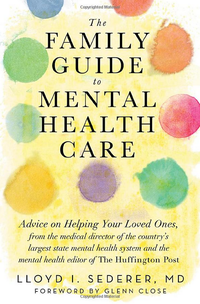Human Masks and Mental Illness
Lloyd I. Sederer, M.D.

We all wear masks. Ordinary life would not otherwise be possible. But these everyday masks are different from the masks that conceal what need not be hidden.
Performers are exemplars in wearing masks. The show must go on. We celebrate their capacity to suspend reality, theirs and ours, and take us on flights of imagination. Performers can don masks of mirth, yearning, fear, desire, bliss, pain, worry, sadness, and much more. When they excel, their masks are convincing: we don't see what's going on behind the mask.
Two iconic performers left their families, friends, and audiences in recent months: Philip Seymour Hoffman and Robin Williams. I knew neither of them personally, and like many fans I had the illusion of knowing them. But I did not. I imagine there were few who knew them past their professional masks.


Each had his mental demons. Credible media and self-reports tell us that they both suffered from serious mood and substance use disorders. Each died as a result of these demons -- Williams hung himself and Hoffman died with a needle in his arm. Each of their deaths produced a wave of bewilderment among their legions of admirers. How could they do this to themselves, these extraordinarily gifted people who lived a life replete with success and wealth? The answer lies behind their masks.
In the past few decades we have demystified many diseases and learned to speak aloud about them: breast cancer, Parkinson's, HIV/AIDS, Alzheimer's, even PTSD (somewhat), to name a few. But clear thinking, understanding, and open dialogue about mental and addictive disorders still elude us. We continue to judge rather than recognize these conditions as illnesses that do not warrant the discrimination and blameworthiness they too frequently receive.
As a result, when these disorders have a fatal outcome we are puzzled. When these diseases take someone we love or value we wonder how that could happen. When we are fooled by masks we look for reasons other than the illnesses themselves.
As a psychiatrist who has worked with patients for many years, I have learned three things about depression -- especially when it is coupled with the excessive use of alcohol and drugs:
--The psychic pain it can produce can exceed the greatest of physical pain; mental pain is all the more difficult to bear because a person can't answer the usual question of 'where does it hurt?'
--Hopelessness is depression's dark co-conspirator; a severely depressed person believes there is no hope for recovery, no end to the pain, no exit from the hell they inhabit.
--People who are depressed realize they are a burden to family and friends: their bleak mood pervades a room and their inability to function results in demands upon others (including assuming their responsibilities and covering their lost income or medical bills); ironically, suicide can have an altruistic appeal when a depressed person thinks being gone will relieve others of their burden.
Many people with mood disorders (including depression and bipolar disorder) turn to alcohol and drugs to ease their psychic pain. Substances work, but only transiently leaving the person in an even deeper hole, and one that calls for more chemical numbing.
Alcohol, narcotics (like heroin and pain pills), and stimulants (like cocaine, meth, and amphetamines) also add to the deadliness of depression because these drugs induce dis-inhibition and impulsivity. The usual mental reservations we have to not act on a troubling idea or feeling are dissolved by drugs; alcohol has been called the 'universal solvent' (solvent is from the Latin, meaning to loosen or untie). When the impulse to die as a means of ending psychic pain, hopelessness, and guilty burden is given freer reign, as it is when intoxicated, the risk of suicide dramatically escalates.
While not the case for Robin Williams and Philip Seymour Hoffman, we know that half of the more than 39,000 deaths by suicide in the US (2011 data, the most recent available) were from gunshot wounds. Ninety percent of suicide attempts by firearm are 'successful' (result in death) while only 10 percent of attempts from overdose (usually with pills) are fatal. Access to deadlier means of suicidal behavior, like guns, contributes significantly to its tragic outcomes.
What helps to explain suicide (and many deaths by drug overdose) is that these were people overcome by the demon of depression. A great proportion of them also had taken substances that blunted their most basic instinct, namely to stay alive.
These are facts that seldom emerge and were too hidden in the wake of the deaths of these two international icons. We cannot know what they would want the public to know -- or others skirting the same precipice as did they. But we do know that almost everyone who survives a suicide attempt is (in time) grateful to be alive. Depression can be treated if a person does not die by their own hands before they get better. That's possible when someone feels able to take off the mask that conceals their pain and their illness, and turn to others to seek life-saving help.
Have a story about depression that you'd like to share? Email strongertogether@huffingtonpost.com -- or give us a call at (860) 348-3376, and you can record your story in your own words. Please be sure to include your name and phone number.
Need help? In the U.S., call 1-800-273-8255 for the National Suicide Prevention Lifeline.
---
 Dr. Sederer's new book for families who have a member with a mental illness is The Family Guide to Mental Health Care (Foreword by Glenn Close).
Dr. Sederer's new book for families who have a member with a mental illness is The Family Guide to Mental Health Care (Foreword by Glenn Close).
Dr. Sederer is a psychiatrist and public health physician. The views expressed here are entirely his own. He takes no support from any pharmaceutical or device company.
www.askdrlloyd.comhttp://www.askdrlloyd.com